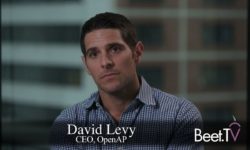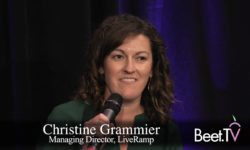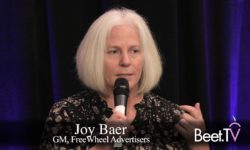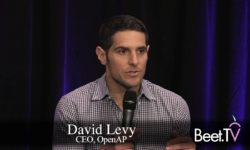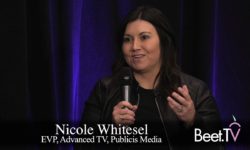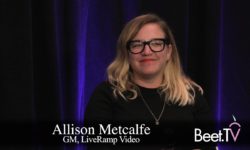The technology isn’t the hard bit, the hard bit is getting everyone to use common standards.
That is the growing refrain from advocates of advanced television advertising techniques like addressable targetability and frequency capping.
They are witnessing a burgeoning set of technical capabilities, and a growing footprint of audiences with the devices to take advantage of them.
But now the industry needs to come together to counter what is a proliferation of such initiatives.
In this video interview during our Beet Retreat In The City event, David Clark, GM & EVP at FreeWheel, tells MTM partner Jon Watts how FreeWheel is seeking partnerships to do that…
Blockgraph for identity
Part of the commonality and interconnectedness that is required concerns identity – or rather, gaining an understanding of consumers’ real identity in a cross-device, post-cookie world, in a way that can be leveraged for TV ad buys.
Recently, Comcast-owned FreeWheel introduced Blockgraph, a new industry initiative focused on creating a more secure way to use data and share information. It is designed to become the “identity layer” for the TV industry, providing a platform on which media companies and publishers can offer marketers data capabilities without disclosing identifiable user data to third parties.
“If you’re a first party data holder, you want the ability to query everybody else’s first party data without having to expose your data to the outside world,” says Clark.
“It’s not just a technological problem. You want to have trust. So we created a thing called blockgraph.
“We’ve incubated it, we spent a lot of money on it… and invite the industry to participate in it. It’s self-funded but not-for-profit entity.
“If you want to join, you run your own node to the graph and, when your data gets queried, you get paid and, when you query other people’s data, you get paid and the match rates are exceptionally high. Then we open it up for all members also to build applications on top of that.”
Addressable scale required
Clark was speaking after Freewheel parent Comcast, Cox and Charter this summer launched On Addressability, a joint initiative to offer advertising customers targeted ads across the outlets.
“We wanted to pull the industry, the major industry, particularly MVPDs to start, to get alignment around how should programmers be enabled, what are the economics behind it, how should it be presented to the marketplace, how should people transact on these things?,” Clark explains.
“(We will) just start a dialogue on that. Not everybody’s going to agree on everything. There’s a recognition in the industry that, until a marketer can run a campaign on some meaningful percentage of American homes in addressable fashion – call it, 70%, just guessing – that the addressable market is not going to emerge.”
Standardization needed
“This year, the big thing we’re hearing from clients in the industry is, ‘We need you to connect us to each other and we need you to play a role, but not alone, in helping with a lot of the operational standards’,” says Clark.
“If you were to list out all the technical problems, the solutions to them are all known. I can probably point to some player in the industry that has solved it.
“The challenge where we are now, and different players are different states … Charter’s doing amazing things, Comcast’s doing amazing things, Dish is doing amazing things, AT&T, programmers, so on and so forth. The next phase is standardising all that.
“It’s just got to fill in the gaps, get it to connect and put the business standards on top. The measurement, the transaction types, remove the friction.
This video was produced at the Beet Retreat leadership event hosted Publicis Media in New York. The event and video series is sponsored by FreeWheel and LiveRamp. For more videos from the event, please visit this page.






